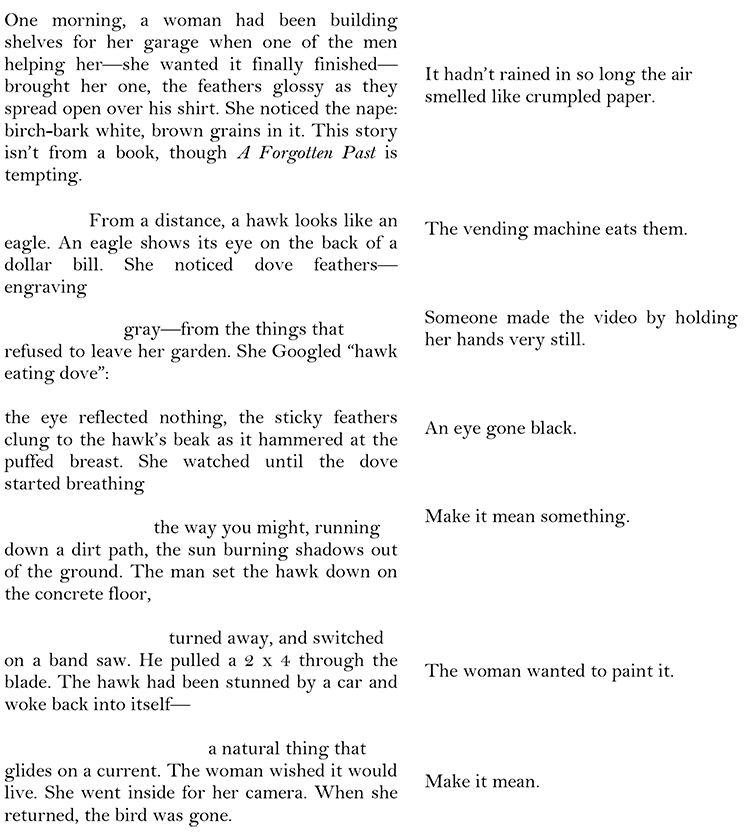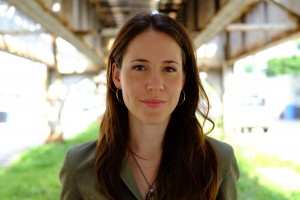Declassified 1962
They eat close to the surf,
laughing as water un-combs
plum threads
from a surface that flickers
quickly in and out of
sunflowers.
I wait for the sudden
sunset, postcard orange, sun-
less as it blooms.
One of the soldiers has a question.
He rubs his nose with his thumb.
Is it that silver
speck up there?
He’s in the cotton white
t-shirt you like to wear.
I fold your sleeves in a mess and press
them to my face—your
stink in the boat
seam of fabric.
“Where the Boys Are” by Connie Francis
drones from a radio speaker, her breath
mingling with the gold-
painted mesh.
They dig their feet in the sand
peaking here & there like buttercream.
Suddenly, the song
stupidly playing
breaks out
of shape, and the men
flinch
then stare
right at the sky.
Song Pulled from a 1954 National Geographic
with wires, needles, or beads of radioactive gold
It isn’t like the skin to choose transparency:
coffee too cool in a cup to blister the tongue.
When does the energy in your bone invite ghosts
to pick through your skull and touch the brain?
My coffee cools hardly hot into my palm.
Who knew the iron v’s of a linden leaf or dragonfly wing
could write through the skull and scratch the brain?
The material lifts lighter than a pencil scoring a game:
one for the iron veining your arm, a leaf, or the glassed wing of a fly.
Burn it longer than coal—more mixed in with the ash.
I won’t watch it lift like a signature from a page
or a piano wire that circles all the ships of the navy.
We burn coal and dream of more in the ash
the way alchemists always almost made gold in a lab.
And a piano wire will hum and hum for the dead.
And a remote control will protect you from the self in the mirror.
One element is now another like gold grown in a lab:
I’ve seen the gapped bridge between an oil field and the sun.
We can control a substance remotely. Like a second self in a mirror,
no sound calls to you from within the walls.
The gap between an oil rig and the inexhaustible sun
closes with words: isos (same) and topos (place).
No smoke emerges from behind the concrete walls.
Sometimes, I sense the presence of forces, unheard and unseen
from a single place. The same place. How
a beam of neutrons releases through an open lid.
Hold your breath against what you can’t hear or see:
your doctor may ask you to drink one of the vials.
Through an open lid, a beam of neutrons will release
the way the energy in a bone invites your ghost in.
Wing the thing your doctor asks. Drink. Drink.
Your body can be made again, transparent.
If
you represent a cloud,
perhaps showing it
unexpected—
soft and strong,
rapid yet
gradual,
will you look out
as if
to say:
isn’t
it just
like that?
Hawk Parable

biography

TYLER MILLS is the author of Tongue Lyre, winner of the 2011 Crab Orchard Series in Poetry First Book Award (SIU Press 2013). Her poems have appeared in The New Yorker, Poetry, Boston Review, The Believer, Georgia Review, and Blackbird, and her work has won magazine awards from Gulf Coast, the Crab Orchard Review, and Third Coast. She is editor-in-chief of The Account: A Journal of Poetry, Prose, and Thought and Assistant Professor of English at New Mexico Highlands University in Las Vegas, New Mexico.